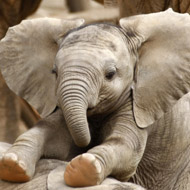Report sheds light on captive elephant welfare

There was strong support for multi-generational family groups consisting of a wide range of ages.
A new report on captive elephant welfare suggests that while enclosures should be as large as possible, they should also provide complexity and interest regardless of their size.
The report, published in UFAW’s journal Animal Welfare, brings together representatives from 15 elephant-holding facilities in the UK, and other experts in captive and free-ranging elephants. The study was carried out as part of a research project commissioned by Defra.
Workshop participants recommended complex environments with a variety of terrains, free access between indoor and outdoor enclosures, a deep pool and places for elephants to hide if they wish.
One participant commented: “You can never give them the space, an animal like this in the captive environment, so whether its 500 acres or 1,000 acres or only 50 acres to the animal itself it won’t make a big difference if it’s not challenging.
“The habitat should be challenging so that they can interact with different items... they have to make choices.”
The group also stressed the importance of replicating social groups that have been seen in wild elephants. There was strong support for multi-generational family groups consisting of a wide range of ages, and for housing social groups together day and night.
Unsurprisingly, scientists found that natural behaviours such as social interaction, exploring, digging, swimming, mud wallowing and scratching were indications of good welfare. The time elephants spend sleeping or lying down was thought to be particularly relevant.
While concerns have been raised about elephant welfare in zoos, little has been done to gather expertise from professionals working with captive elephants. The study aimed to develop and validate a new behavioural assessment tool for elephant welfare, and to inform an evidence-based update of current guidelines.
The researchers concluded: ‘In advocating the use of expert opinion in welfare assessments, we recognise that opinion alone should not determine welfare measures, or inform husbandry guidelines.
‘Rather, stakeholder expertise should be considered alongside scientific evidence to develop a holistic approach to welfare assessment.
‘The stakeholder focus groups and workshops were invaluable in contributing to our understanding of the practical assessment of elephant welfare and resources of importance to elephants in captivity.’



 The Veterinary Medicines Directorate (VMD) is inviting applications from veterinary students to attend a one-week extramural studies (EMS) placement in July 2026.
The Veterinary Medicines Directorate (VMD) is inviting applications from veterinary students to attend a one-week extramural studies (EMS) placement in July 2026.